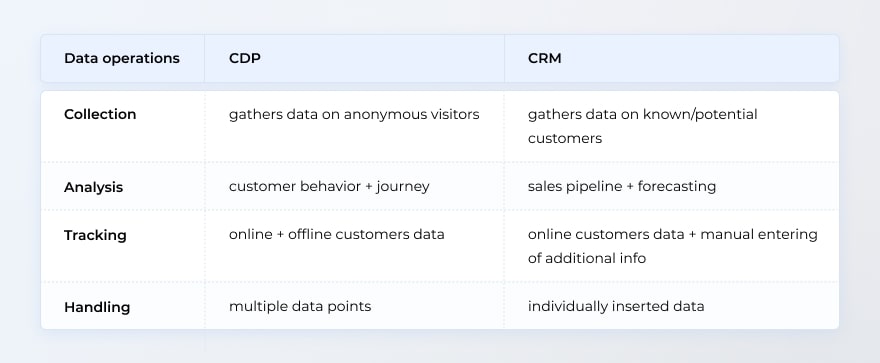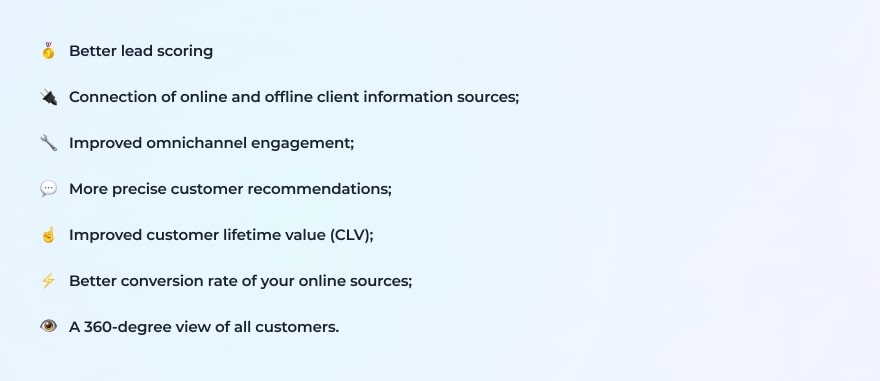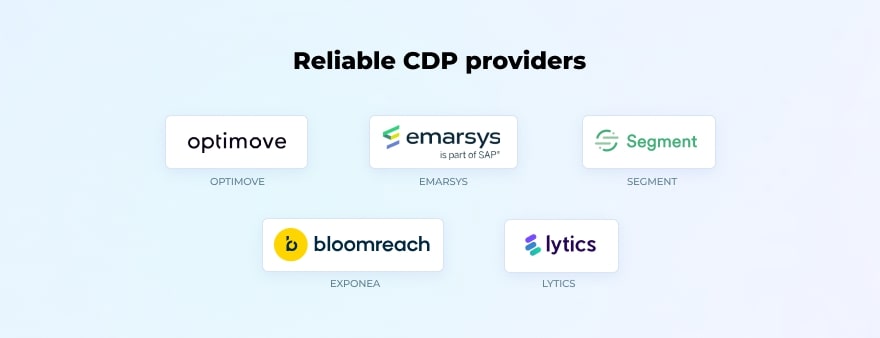Table of Contents
Virtually every company that sells goods or services deals with lots of clients on a daily basis. Sometimes the influx of customers can be intimidating and hard to handle. No wonder, the spectrum of issues that customers can encounter could be incredibly wide ranging.
These days companies have websites, mobile applications, social media, advertising tools leading to their online stores and actual physical retail store locations. And let’s not forget about internal solutions for collecting, analyzing and storing all the data about customers.
However, quantity doesn’t always mean quality. According to the statistics, 20% of all database records used by companies contain contact data with data quality issues. Also almost 50% of new data collected by businesses has one or more critical errors.
So with so many customer touchpoints and so many accuracy mistakes, is this possible for a company to be sure that all customer data is not lost and is processed effectively in the end? The answer is yes, but only if a company has a data-first Customer Data Platforms (CDPs) that does the job.
So in this post, we are going to discuss customer data platforms, the main types of these solutions, for what purpose it is developed and what processes it helps automate. We will also share our own experience and explain how to develop your own CDP, how much to invest in it and what features to include. Can’t wait to discover all those things? Then let’s get started!
What is a Customer Data Platform?
To begin with, let’s define what is a CDP. Basically, it is a digital tool that is able to collect data from different customer touch points, organize it in one centralized place, structure and analyze it in real-time. CDP can also be used by other software to help the company with marketing campaigns, sales deals, and creation of one unified customer base that is easy to access and manage.
In other words, a customer data platform helps to unite the efforts of your marketing, sales and client service teams to form a customer-based approach. This improves overall customer service and experience and encourages client loyalty that is very important for a company and its stable growing income.
By now you may be wondering what kind of information CDP solution can collect and work with. Basically, there are 4 key data types that a customer data platform is able to process effectively. They are the following:
One frequently asked question that we always face when we provide development information is “Are CRM and CDP the same since they both collect client-related data?” The answer is no, in fact data collection is the only thing that they have in common. To help you understand all the differences CDP and custom CRM have, we have prepared the following infographics.
Main types of Customer Data Platforms
Now when you know what CDP is and how it differs from a common CRM, it is time to proceed to the main types of this software. In general, all CDPs can be divided into four big groups depending on their purpose and the tasks they accomplish. Let’s take a closer look at each of the types and find out what they offer.
It is also worth mentioning that in recent years, cloud-based CDPs have become more popular among companies. Cloud migration itself offers numerous benefits. If you are wondering what they are, then take a look at our article covering this topic.
What businesses need customer data management software?
As we’ve already mentioned, CDP can be a real game-changer for businesses able to minimize errors related to customer data entry, processing and analysis. Not only can it help you improve customer service, but also CDP is capable of changing the whole marketing strategy of a company.
So now you may be wondering, what companies apart from e-commerce ones may need customer data platforms. Well, we’d say almost every company that works with numerous clients. CDPs are necessary for:
- Real estate agencies,
- Retail companies,
- Marketing and digital agencies,
- Huge enterprises,
- Manufacturers of goods (especially custom ones),
- Travel and booking companies,
- Construction businesses,
- Restaurants and cafes,
- Companies responsible for delivery,
- Franchises,
- Gyms and sport halls,
- Renting companies, and many more.
So as you can see, customer data platforms are suitable for different business models. But how would you know if it is needed for your particular company? It is quite easy, all you need to do is ask yourself a couple of questions:
- How is the customer data managed now? If your data from different departments (sales, marketing, purchasing, etc) is stored in silos and often lacks some crucial customer information, then CDP is for you.
- How is the data used by current systems? CDP is necessary when your company experiences issues with data transfer between systems and when there is no unified standard of data storing and processing.
- What is the quality of collected data? You need to find out whether you have any cases of major data duplication, significant human mistakes or even data loss. If you have any of those issues, then you need a CDP to improve data collection and encourage effective data usage for marketing purposes.
- Is my company CDP ready? To identify this you need to analyze whether you have a clear picture of your customer journey and enough clarity on possible use cases. Also you need to review your current systems such as CRM, ERP or else to find out possible integration opportunities.
- What KPIs do you expect to improve? Before implementing CDP you should clearly define what indexes you would like to measure and what you’d like to achieve. Perhaps you want to decrease time spent on data searching and processing, or maybe your goal is to decrease customer data redundancy.
- What is the ROI of investing in CDP? Speaking about businesses, we cannot neglect such an important factor as ROI. One of the latest papers reveals that 90% of enterprises will implement a CDP by 2022. But why are they so eager to do this? Basically because thanks to CDP they can achieve 9.1x YoY growth in customer satisfaction, 2.9x YoY growth in overall company revenue, and 4.5x annual increase in employee engagement. Quite impressive, right?
Major advantages of CDP software
Considering implementation of the new software like CDP, business owners often take into account the most important decision making point – the real value and benefits that software will bring to a company. So when it comes to CDP, what can it offer? IS it really such a great investment? Let’s take a closer look at all CDP benefits to get a bigger picture and to be totally objective.
Apart from these major benefits, CDP offers the following pros:
If you still doubt whether CDP is a must-have for your company, then we suggest that you watch the video below. There you will find an explanation of what makes customer data platform software so irreplaceable and what differs it from other business tools.
How to develop your own custom CDP solutin
The development of your own customer data platform requires dedication and a highly experienced team, because you are going to invest not only your money but also your precious time. And everything should turn out the best possible way. So first of all, find the right development partner with an extensive domain expertise. You will need the following specialists to complete your CDP development and release:
- Business Analyst;
- Scrum Master,
- Designer;
- Front-end developers;
- Back-end developers;
- System Administrator;
- Quality Assurance specialist.
Make sure that the team you are hiring has experience in building customer data platforms and their integration with other systems such as CRMs and ERPs. Check out company portfolio, real clients reviews and ask as many questions as you need to discover all details of further cooperation.
Once you’ve settled with your team, the preparation and development will get started. The development of CDP will include several key stages that are the following:
- Requirements gathering and analysis of ready-made solutions;
- Specifications writing and formulation of your project vision;
- Design and wireframes;
- Development and integration of all services;
- Quality assurance and various checks;
- Deployment and release.
Also it is a good practice to release a demo version of CDP or as we call it an MVP to test how this solution fits into your working processes and what can be improved to make it even more effective.
Speaking about the development cost, you should know that a feature-rich customer data platform may cost you $75,000 – $100,000. The average development time is 4-6 months. After everything is finished you receive a set and ready solution that you can start using to your advantage at once. Although the price tag seems hefty, custom CDP is worth every penny and it will pay itself off earlier than you think.
As to the MVP, it will cost you less and will be delivered faster than the full version of the solution. The MVP can be easily improved with time and transformed into a more powerful solution. So it might be a good decision to invest in MVP first.
Top 7 must-have features of Customer Data Platform
While considering CDP development, many companies face the question “What features to add to make the solution the most useful?”. We’d like to emphasize that the feature set for different businesses can vary. But of course there are some options that every company can make use of. Here are some of them:
Custom development vs ready-made solutions
By now you may be asking yourself one simple question “Why should I put in so much effort and build my own CDP when the market is full of ready solutions?” So to dispel all doubts and help you make the right decision, let’s discuss in brief why it is better to build your own solution than use a ready-made one.
The first and most important factor to consider is the actual cost. All ready-made customer data platforms don’t come cheap. Let’s take the Segment that asks for a payment in the amount of $1,200 to $200,000 per year. Seems not so cheap, right? But there is one more provider that asks for even more – Lytics will charge you $60,000 to $300,000 per year. Among other high quality CDP providers you can see Emarsys, Exponea, and even a high-tech AI powered platform called Optimove. They all offer a great set of features in different packages and promise to boost your business. And that promise is quite real, but remember – it will cost you some significant amount of money too.
And the cost is not the only factor that can influence your decision. The second factor would be customization opportunities. With ready-made solutions they are quite limited. You just get what you paid for and try to fit it into your business model. But what if there are not enough options? Or what if you do not need some of them and would prefer others?
You will have to accept ready-made CDP as it is and try to adapt to it. While the custom solution will be fully adapted to you and your business needs. And that is what makes it many times better. Plus, you are paying for its development once and get access to it forever free-of-charge unless it requires maintenance or upgrading. Custom solutions are long lasting and scalable, they are malleable and can grow and improve together with your business. And that is exactly what every company needs.
Our experience in building custom CDP
We cannot emphasize enough how important it is to find the right development partner when you start the digital transformation of your business. To build a custom CDP is not an easy task. So it is better to delegate it to a team with extensive experience like Altamira.
We have worked with many companies of different sizes and business models. And by building CDPs for them we’ve honed our skills and resolved numerous challenges that are not an obstacle for us now. Dedication, industry knowledge, and many years of development practice help us deliver high quality CDPs at a great price/quality ratio.
One of the recent projects we’ve completed and would like to share with you was Private Equity Info – a solid database with firm information from different sectors for a target audience of professionals like investment bankers. Thanks to this solution people can access the information about thousands of private equity firms, check contact information, acquisition criteria, portfolios and many more. Check out how Private Equity looks and works here:
So if you are interested in developing CDP of a kind or maybe even something more complex, don’t hesitate and get in touch with us. We will guide you through all processes, help you with the specifications and other technical documentation, project development and testing, and also the integration of a new CDP into your working environment.
FAQ
To wrap it up
Whatever line of business you are in, you likely face stiff competition. And sometimes the struggle is tough, especially when you are trying to prop up customer satisfaction and loyalty rates. These days companies should be very attentive to their customers, know their tastes and preferences, anticipate their needs and fulfill them, and it is possible only when you have a holistic client base.
It is no longer enough to have a reliable CRM to handle customer information, you need something more sophisticated and smart. Companies need customer data platforms that are capable of collecting, analyzing and storing the information in one centralized database. And what’s more important is that information will not just stay “untouched”, it will be actively used for your own benefit.
The customer data should not be a burden that complicates the job for your employees, on the contrary, it should become your biggest helper and weapon. Thanks to custom CDP solutions every business can boost its productivity, income and encourage high levels of client trust. And what more is there to ask for?





